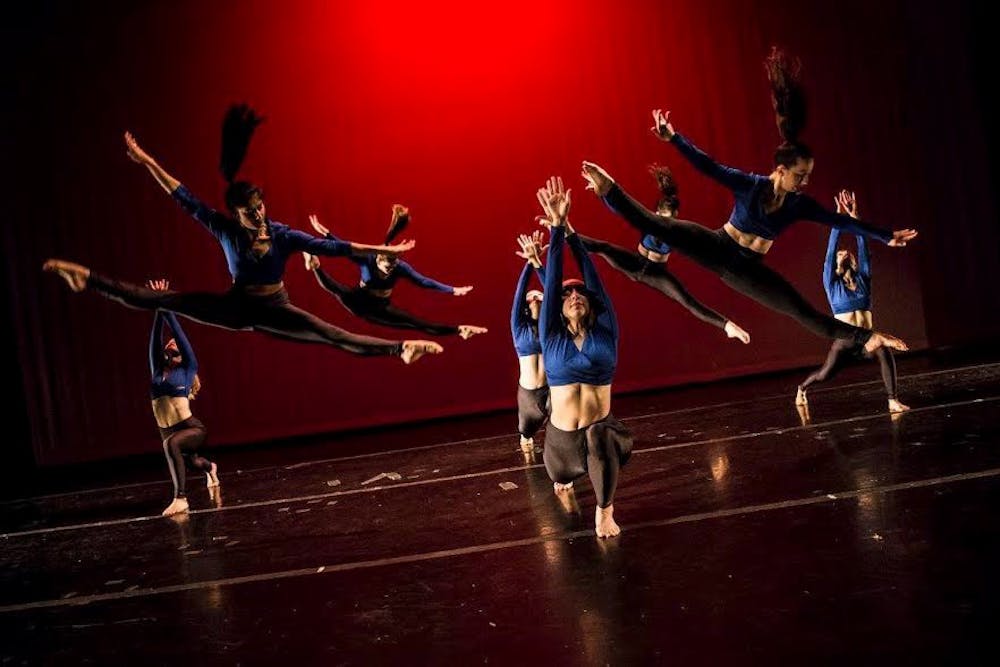Performing arts groups have long struggled to secure rehearsal and performance space at Penn, but this semester the task has become even more challenging.
Over the past three years, Pottruck Health and Fitness Center has phased out a discount offered to student performing arts groups reserving studio space. Next semester, the discount will be entirely eliminated. The loss of the discount has resulted in a dramatic increase in the cost of the rehearsal space at Pottruck — a popular rehearsing option for many dance arts groups — prompting the Performing Arts Council to reserve less space there for its constituent groups.
Of all the rehearsal space available to performing arts groups, nearly 100 percent has been used up, according to the September and October data provided by Wharton senior Nick Silverio, who serves as the financial coordinator of PAC, which houses other groups such as the Dance Arts Council, of which Silverio is chair.
Many students have noticed a space crunch as groups under PAC scramble to find places to both rehearse and perform, sometimes alternating times with other student groups who use the same space during a given week.

How have Pottruck's policies changed this year?
Director of Penn Athletics Business Development Joe Haughey wrote in an email that rates for Pottruck’s spaces have not increased, but management started applying full fees to all students including groups with PAC “to be equitable."
Silverio said in previous semesters that DAC groups would spend about 20-30 hours a week in Pottruck studios, as opposed to an estimated eight hours a week they spend there this semester.
“Pottruck is trying to create a more sustainable business model, which I understand,” Silverio said. “The problem is that many of the facilities go unused … we’re fighting for space while the studios are sitting there open most of the time except when [Pottruck] has group classes.”
Silverio added that this increased expense is “disheartening” considering that Penn students pay for Pottruck with their tuition.
In addition to the tuition cost of $47,416, there are added fees that students pay to attend Penn. The general fee is $4,752, the technology fee is $820, and the student health and clinical fee is $546. This is the first year, however, that there is no separate fee for recreation. Instead, that fee was added to the general fee, which resulted in a 12.5 percent increase in the general fee since the previous year.
This year is also the first time that the recreation fee is required for all graduate and professional students to pay. Over the next four years, the general fee for graduate and professional students will increase gradually in order to account for the incorporated fee.

What are the effects of these shifts?
With Pottruck no longer affordable, PAC reserves more space in Platt Performing Arts house, Perelman Quad, Harnwell, Emily Sachs Studio, and Houston Hall, which have been at near maximum capacity this past semester.
Director of Platt Student Performing Arts House Laurie McCall said that the high demand of space is due to the large number of performing arts groups at Penn. The Performing Arts Council alone encompasses over 46 different student-run performance organizations, which conduct more than 60 performances annually.
INtuitons Experimental Theater Chair and Engineering senior Noah Lee said that because of the recent “space crunch,” his group sometimes does not receive as many rehearsal slots as they request from PAC, which is responsible for scheduling practice space for its constituent groups.
Executive and Artistic Director for the Annenberg Center of the Performing Arts Christopher Gruits said groups prefer to perform in the late fall and late spring, which creates a scheduling “bottleneck."
Many groups “space share,” which means two or more groups prepare their productions in the same theater for the same week, staggering their performances, Silverio said.
Penn Dance president and College senior Emilia Hinckley said her group was scheduled to perform at the Iron Gate Theatre with two other groups in the same week this semester, which she described as logistically “insane.”
Hinckley added that she had never before heard of three groups having to “triple space share."

How is the performing arts community coping?
McCall said Platt, which works closely with PAC to provide spaces for groups and to cover rental fees, is seeking more space in unconventional places. Gruits added that Annenberg plans to collaborate closely with Platt to keep spaces open for for students, especially during times of the year that are traditionally popular.
Staff at Platt have recently started connecting students to rehearsal and venue space off campus, such as the Hospital of the University of Pennsylvania.
"They have classroom auditoriums, but I don't know if we can perform in them," McCall said.
Lee, who is also an executive board member of the Students Activities Council, said the PAC executive board is working with the Undergraduate Assembly and SAC to vocalize its concerns to the University.
Silverio said he hopes this effort will encourage the University to build a new performance arts space for students.
“If you compare with other schools, like Princeton just got a brand new state of the art studio, it’s sort of disheartening. It doesn’t feel as though we are as supported as we could be,” Silverio said.
Hinckley said that the University should take the performing arts community’s concerns more seriously, noting the “thousands” of students involved in performing arts and noting famous alumni like John Legend and Elizabeth Banks.
“We have professional-level talent on this campus, but I don’t think the University all the time pays that much attention to it,” Hinckley said. “Especially since we don’t have a lot of academic routes for exploring talents, student groups become some of the only performance spaces that students have. Penn should treat [us] with a more professional quality.”



